His Divine Grace A.C. Bhaktivedanta Swami Prabhupada
Today I shall speak to you about the glorification of the holy name of God. This was discussed between Maharaja Pariksit and Sukadeva Gosvami in connection with a brahmana who was very fallen and addicted to all kinds of sinful activities but was saved simply by chanting the holy name. This is found in the Sixth Canto of Srimad-Bhagavatam.
The universal planetary systems are very nicely explained in the Fifth Canto of Srimad-Bhagavatam. Within the universe there are some planets which are hellish. Actually, not only the Bhagavatam but all religious scriptures contain descriptions of hell and heaven. In Srimad-Bhagavatam you can find out where those hellish planets are and how distant they are from this planet, just as you can obtain information from modern astronomy. Astronomers have calculated how far the moon is from here and what the distance is between this planet and the sun; similarly, the Bhagavatam contains descriptions of the hellish planets.
We have experience of different atmospheric conditions even on this planet. In the western countries near the North Pole, the climate is different than in India, which is near the equator. Just as there are differences in atmosphere and living conditions on this planet, similarly there are many planets which have different atmospheres and conditions of life.
After hearing a description of the hellish planets from Sukadeva Gosvami, Pariksit Maharaja said, adhuneha maha-bhaga yathaiva narakannarah / nanograyatananneyattanme vyakhyatumarhasi: “Sir, I have heard from you about the hellish planets. Men who are very sinful are sent to those planets.” Pariksit Maharaja is a Vaisnava (devotee), and a Vaisnava always feels compassion for others’ distress. He is very afflicted by the miseries of others. When Lord Jesus Christ presented himself, for instance, he was greatly afflicted by the miserable conditions of the people. Regardless of which country or sect they belong to, all Vaisnavas or devotees—any people who are God conscious or Krsna conscious—are thus compassionate. Therefore to blaspheme a Vaisnava, a preacher of God’s glories, is a great offense.
Krsna, God, is never tolerant of offenses committed at the lotus feet of a Vaisnava. Krpambudhi: A Vaisnava is an ocean of mercy. Vanca-kalpa-taru: Everyone has desires, but a Vaisnava can fulfill all desires. Kalpa-taru means desire tree. There is a tree in the spiritual world which is called a desire tree. In this material world, you get a particular type of fruit from a particular type of tree, but in Krsnaloka as well as in all the Vaikuntha planets, all the trees are spiritual and will fulfill all your desires. That is described in the Brahma-samhita: cintamani-prakara-sadmasu kalpa-vrksa.
 A Vaisnava is addressed as mahabhaga, which means “fortunate.” One who becomes a Vaisnava and is God conscious is understood to be greatly fortunate.
A Vaisnava is addressed as mahabhaga, which means “fortunate.” One who becomes a Vaisnava and is God conscious is understood to be greatly fortunate.
Caitanya Mahaprabhu has explained that the living entities are rotating in different species of life, in different planetary systems all over the universe. A living entity can go anywhere—to hell or heaven—as he likes and as he prepares himself. There are many heavenly planets, many hellish planets and many species of life. There are 8,400,000 species of life. The living entity is rotating, wandering through these species and creating bodies according to his mentality in the present life. As you sow, so shall you reap.
Caitanya Mahaprabhu says that out of all these numberless living entities who are traveling in the material world, one is fortunate, not everyone. If everyone were fortunate, they would all have taken to Krsna consciousness. It is being distributed freely everywhere. But why are people not taking it? Because they are unfortunate. Therefore Caitanya Mahaprabhu says that only those who are fortunate take to this Krsna consciousness, and they get hopeful life, pleasant life, blissful life, a life of knowledge.
It is the duty of a Vaisnava to go door to door to make the unfortunate people fortunate. A Vaisnava thinks, “How can these people be delivered from their hellish life?” That was Pariksit Maharaja’s inquiry. “Sir,” he said, “you have described that on account of one’s sinful activities he is put into a hellish condition of life or in a hellish planetary system. Now, what are the counter methods by which such persons can be saved?” This is the question. When a Vaisnava comes, when God Himself comes, or when God’s son or His very confidential devotees come, their only mission is to save the sinful men who are suffering. They have knowledge of how to do this.
When Prahlada Maharaja met Nrsimhadeva, he said:
naivodvije para duratyaya vaitaranyas
tvadvirya gayana mahamrta-magna-cittah
soce tato vimukha-cetasa indriyartha
maya-sukhaya bharamudvahato vimudhan
“My dear Lord,” Prahlada says, “I am not very anxious for my own deliverance.” Mayavadi philosophers are very careful that their personal salvation is not interrupted. They think, “If I go to preach in association with others, I may fall down, and my realization will be finished.” Therefore they do not come. Only the Vaisnavas come, at the risk of falldown—but they do not fall down. They may even go to hell to deliver the conditioned souls. This is Prahlada Maharaja’s mission. He says, naivodvije udvije: “I am not very anxious about living in this material world.”
Prahlada Maharaja says further, “I have no anxiety for myself because somehow or other I have been trained to be always Krsna conscious.” Because he is Krsna conscious, he is confident that in his next life he is going to Krsna. It is stated in Bhagavad-gita that if one executes the Krsna conscious regulative principles carefully, it is certain that he will reach the supreme destination in his next life.
Prahlada Maharaja continues: “There is only one source of anxiety for me.” Just see—although he had no anxiety for himself, he still had anxiety. He says, soce tato vimukha-cetasa: “I am anxious for those persons who are not Krsna conscious. That is my anxiety. For myself I have no anxiety, but I am thinking of those who are not Krsna conscious.” Why aren’t they Krsna conscious? Maya-sukhaya bharamudvahato vimudhan. These rascals have created a humbug civilization for temporary happiness.
Maya-sukhaya. Actually this is a fact. We have a humbug civilization. So many cars are being manufactured every year, and for that purpose so many roads have to be excavated and prepared. This creates problem after problem. Therefore it is maya-sukhaya, illusory happiness, and yet we are trying to be happy in this way. We are trying to manufacture some way to be happy, but this only creates other problems.
In your country you have the greatest number of cars, but that does not solve any problems. You have manufactured cars to help solve the problems of life, but I have experienced that this also creates more problems. When my disciple Dayananda wanted to take me to a doctor in Los Angeles, I had to take the trouble to travel thirty miles before I could even consult the doctor. Once you create cars, then you must travel thirty or forty miles to meet your friends.
You can go from New York to Boston in one hour, but it takes even longer than that just to get to the airport. This situation is called maya-sukhaya. Maya means false, illusory. We are trying to create some very comfortable situation, but we have created another uncomfortable situation. This is the way of the material world; if we are not satisfied by the natural comforts offered by God and nature and we want to create artificial comforts, then we have to create some discomfort also. Most people do not know that. They think that they are creating a very comfortable situation, but actually they are traveling fifty miles to go to the office to earn a livelihood and fifty miles to come back. In Hawaii, one boy, Gaursundar, was working to maintain our temple. Unfortunately he had to go fifty miles from the temple to work. I was very sorry to see that this boy had to go fifty miles for Krsna’s sake, but now Krsna has given us the facility so that we don’t have to work. Because of such conditions, Prahlada Maharaja says that these vimudhans—these materialistic persons, these rascals—have created an unnecessary burden on themselves simply for temporary happiness. Vimudhan, maya-sukhaya bharamudvahato. Therefore, in Vedic civilization, it is recommended that one free himself from material life, take sannyasa, the renounced order of life, and prosecute spiritual life with absolutely no anxiety.
If one can execute Krsna consciousness in family life, that is very good. Bhaktivinode Thakur was a family man, a magistrate, and still he executed devotional service so nicely. Dhruva Maharaja and Prahlada Maharaja were grhasthas, householders, but they trained themselves in such a way that even as householders they were faced with no interruption in their service. Therefore, Prahlada Maharaja says, ” I have learned the art of always remaining in Krsna consciousness.” What is that art? Tvadvirya gayama mahamrta-magna-cittah. Simply glorifying the victorious activities and pastimes of the Lord. Virya means “very heroic.”
Krsna’s activities are heroic. You can read about them in Krsna Book. Krsna’s name, His fame, His activities, His associates and everything else are heroic. Prahlada Maharaja says in this connection, “I am certain that wherever I go, I can glorify Your heroic activities and be safe. There is no question of my falling down. But I am simply anxious for these persons who have created a type of civilization in which they are always busy working hard. I am thinking of them.”
Prahlada says further:
prayena deva munyah sva-vimukti-kama
maunam caranti vijane na parartha-nistah
naitan vihaya krpanan vimumuksa eko
nanyam tvadasya saranam bramato ‘nupasye
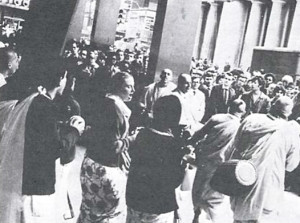 “My dear Lord, there are many saintly persons and sages who are very interested in their own liberation.” Munayah means saintly persons or philosophers. Prayena deva munayah sva-vimukti-kama: they are very interested in their own liberation. They try to live in solitary places like the Himalayan mountains. They do not talk to anyone, and they are always afraid of mixing with ordinary people in the city and becoming disturbed or maybe even falling down. They think, “Better let me save myself.”
“My dear Lord, there are many saintly persons and sages who are very interested in their own liberation.” Munayah means saintly persons or philosophers. Prayena deva munayah sva-vimukti-kama: they are very interested in their own liberation. They try to live in solitary places like the Himalayan mountains. They do not talk to anyone, and they are always afraid of mixing with ordinary people in the city and becoming disturbed or maybe even falling down. They think, “Better let me save myself.”
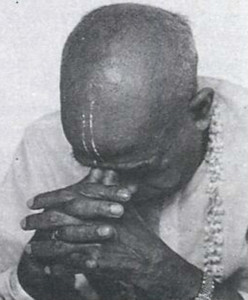 Prahlada Maharaja regrets that these great saintly persons do not come to the city, where people have manufactured a civilization of very hard work all day and night. Such saints are not very compassionate. He says, “I am anxious for these fallen people who are unnecessarily working so hard simply for sense gratification.”
Prahlada Maharaja regrets that these great saintly persons do not come to the city, where people have manufactured a civilization of very hard work all day and night. Such saints are not very compassionate. He says, “I am anxious for these fallen people who are unnecessarily working so hard simply for sense gratification.”
Even if there were some point in working that hard, such people do not know what it is. All they know is sex. Either they go to a naked dance or to a naked club or to this or that. Prahlada Maharaja says, naitan vihaye krpanan vimumuksa eko. “My Lord, I do not need salvation alone. Unless I take all these fools with me, I shall not go.” He refuses to go to the kingdom of God without taking all these fallen souls with him. This is a Vaisnava. Nanyam tvadasya saranam bramato ‘nupasye: “I simply want to teach them how to surrender unto You. That’s all. That is my goal.”
The Vaisnava knows that as soon as one surrenders, one’s path is clear. Naivodvije para duratyayavai taranyas-tvadvirya gayana mahamrta-magna-cittah: “Simply, somehow or other, let them bow down before Krsna.” This is a simple method. All you have to do is bow down before Krsna with faith and say, “My Lord Krsna, I was forgetful of You for so long, for so many lives. Now I have come to consciousness; please accept me.” That’s all. If one simply learns this technique and sincerely surrenders himself to the Lord, his path is immediately open. These are the philosophical thoughts of a Vaisnava. A Vaisnava is always thinking about how the fallen conditioned souls can be delivered. They are always involved in making plans in that way, just like the Gosvamis. What was the business of the six Gosvamis of Vrndavana, Lord Caitanya’s direct disciples? That is stated by Srinivasa Acarya:
nana sastra-vicaranaika-nipunau sad-dharma-samsthapakau
lokanam hitakarinau tribhuvane manyau saranyakarau
radha-krsna-padaravinda bhajananandena mattalikau
vande rupa-sanatanau raghuyugau sri-jiva-gopalakau.
“The six Gosvamis, namely, Sri Sanatana Gosvami, Sri Rupa Gosvami, Sri Raghunatha Bhatta Gosvami, Sri Raghunatha Dasa Gosvami, Sri Jiva Gosvami and Sri Gopala Bhatta Gosvami, are very expert in scrutinizingly studying the revealed scriptures with the aim of establishing eternal religious principles for the benefit of all human beings. They are always absorbed in the mood of the gopis and are engaged in the transcendental loving service of Radha and Krsna.”
With similar Vaisnava compassion, Pariksit Maharaja says to Sukadeva Gosvami, “You have described the different types of hellish conditions of life. Now, tell me how those who are suffering can be delivered. Kindly explain this to me.” Adhuneha maha-bhaga yathaiva narakannarah/ nanograyatan-anneyattanme. Nara means human beings, those who are fallen. Narakannarah nanograyatananneyattan me : “How can they be delivered from their fierce miseries and horrible pains?” That is a Vaisnava heart. Maharaja Pariksit says, “Somehow or other they have fallen down to this hellish life. But that does not mean that they should remain in that condition. There must be some means by which they can be delivered, so kindly explain that.”
Sukadeva Gosvami replied:
na cedihaivapacitim yathamhasah
krtasya kuryanmanauktipanibhih
dhruvam sa vai pretya narakanupaiti
ye kirtita me bhavatastigmayatanah
“Yes, I’ve already described the different types of hellish conditions and very severe painful life, but one has to counteract it.”
How can this be done? Sinful activities are committed in various ways. We can commit sinful activity and thus make a plan—”I shall kill that man”—that is still sinful. When the mind is thinking, feeling and willing, then there is action.
The other day I was reading in a book that if someone’s dog barks at you when you are passing on the road, then that is an offense on the part of the dog-owner, according to law. No one should have to be scared by dogs barking, so one should take care of his dog. I read this. It is a law in your country. The dog is simply barking, but it is sinful. The dog is not responsible because it is an animal, but because the owner of the animal has made the dog his best friend, he is responsible by law. If an outside dog enters your house, it may not be killed, but the owners of the dog may be prosecuted.
Just as the barking of the dog is unlawful, so when you speak something offensive to others, that is also sinful. That is just like barking. Therefore sinful activities are committed in so many ways. Whether we think of sinful activities, or we speak something sinful, or we actually commit a sinful activity, they are all considered sinful activities. Dhruvam sa vai pretya narakanupaiti. One has to suffer punishment for such sinful activities.
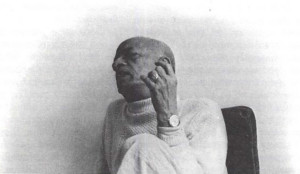 People do not believe in a next life because they want to avoid this botheration. But we cannot avoid it. We must act according to the law, or we will be punished. Similarly, I cannot avoid God’s law. That is not possible. I can cheat others, commit theft and hide myself, thereby saving myself from the punishment of the state law, but I cannot save myself from the superior law, the law of nature. It is very difficult. There are so many witnesses. The daylight is witness, the moonlight is witness, and Krsna is the supreme witness. You cannot say, “I am committing this sin, but no one can see me.”
People do not believe in a next life because they want to avoid this botheration. But we cannot avoid it. We must act according to the law, or we will be punished. Similarly, I cannot avoid God’s law. That is not possible. I can cheat others, commit theft and hide myself, thereby saving myself from the punishment of the state law, but I cannot save myself from the superior law, the law of nature. It is very difficult. There are so many witnesses. The daylight is witness, the moonlight is witness, and Krsna is the supreme witness. You cannot say, “I am committing this sin, but no one can see me.”
Krsna is the supreme witness sitting within your heart. He notes down what you are thinking and what you are doing. He also gives facility. If you want to do something to satisfy your senses, Krsna gives the facility for that action. That is stated in Bhagavad-gita. Sarvasya caham hrdi samnivisto: “I am sitting in everyone’s heart.” Mattah smrtir–jnanam-apohanam ca: “From Me come remembrance, knowledge and forgetfulness.”
In this way Krsna gives us a chance. If you want Krsna, then He will give you a chance to have Him, and if you don’t want Krsna, then He will give you a chance to forget Him. If you want to enjoy life forgetting Krsna, forgetting God, then Krsna will give you all facility so that you can forget, and if you want to enjoy life with Krsna consciousness, then Krsna will give you the chance to make progress in Krsna consciousness. That is up to you.
If you think that you can be happy without Krsna consciousness, Krsna does not object to that. Yathecchasi tatha kuru. After advising Arjuna, He simply said, “Now I have explained everything to you. Whatever you desire you can do.” Arjuna replied immediately, karisye vacanam tava: “Now I shall execute Your order.” That is Krsna consciousness.
God does not interfere with your little independence. If you want to act according to the order of God, then God will help you. Even if you fall down sometimes, if you become sincere—”From this time on I shall remain Krsna conscious and execute His orders”—then Krsna will help you. In all respects, even if you fall down, He will excuse you and give you more intelligence. This intelligence will say, “Don’t do this. Now go on with your duty.” But if you want to forget Krsna, if you want to become happy without Krsna, He will give you so many chances that you will forget Krsna life after life.
Pariksit Maharaja says here, “It is not that if I say there is no God then there will be no God or I will not be responsible for what I do.” That is the atheistic theory. Atheists do not want God because they are always sinful—if they thought that there were God, then they would be forced to shudder at the thought of punishment. Therefore they deny the existence of God. That is their process. They think that if they do not accept God then there is no punishment and they can do whatever they like.
When rabbits are being attacked by bigger animals, they close their eyes and think, “I am not going to be killed.” But they are killed anyway. Similarly, we may deny the existence of God and the law of God, but still God and His law are there. In the high court you may say, “I don’t care for the law of the government,” but you will be forced to accept the government law. If you deny the state law, then you will be put into prison and be caused to suffer. Similarly, I may foolishly decry the existence of God—”There is no God” or “I am God”—but, nevertheless, you are responsible for all your actions, both good and bad.
There are two kinds of activities—good and bad. If you act nicely and perform pious activities, then you get good fortune, and if you act sinfully, then you have to suffer. Therefore Sukadeva Gosvami says:
tasmat-puraivasviha papa-niskrtau
yateta mrtyoravipadyata “tmana
dosasya drstva guru-laghavam yatha
bhisak cikitseta rujam nidahavit
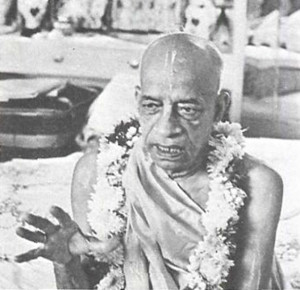 There are different kinds of atonement. If you commit some sin and counteract it by something else, that is atonement. There are examples of this in the Christian Bible. Sukadeva Gosvami says, “You should know that you are responsible, and according to the gravity of sinful life, you should accept some type of atonement as described in the sastras, the scriptures.”
There are different kinds of atonement. If you commit some sin and counteract it by something else, that is atonement. There are examples of this in the Christian Bible. Sukadeva Gosvami says, “You should know that you are responsible, and according to the gravity of sinful life, you should accept some type of atonement as described in the sastras, the scriptures.”
Actually, just as when one is diseased he must go to a doctor and pay doctor bills as a form of atonement, according to the Vedic way of life there is a class of brahmanas to whom one should go for the prescribed atonement according to the sins one commits.
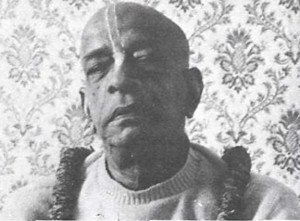 Sukadeva Gosvami says that one has to execute the prescribed atonement according to the gravity of one’s sinful life. He continues the example: dosasya drstva guru-laghavam yatha bhisak cikitseta rujam nidanavit. When you consult a physician, he prescribes an inexpensive medicine or a costly medicine according to the gravity of the disease. If you simply have a headache he may prescribe an aspirin, but if you have something very severe, he immediately prescribes a surgical operation which will cost a thousand dollars. Similarly, sinful life is a diseased condition, so one must follow the prescribed cure to become healthy.
Sukadeva Gosvami says that one has to execute the prescribed atonement according to the gravity of one’s sinful life. He continues the example: dosasya drstva guru-laghavam yatha bhisak cikitseta rujam nidanavit. When you consult a physician, he prescribes an inexpensive medicine or a costly medicine according to the gravity of the disease. If you simply have a headache he may prescribe an aspirin, but if you have something very severe, he immediately prescribes a surgical operation which will cost a thousand dollars. Similarly, sinful life is a diseased condition, so one must follow the prescribed cure to become healthy.
Acceptance of the chain of birth and death is a diseased condition of the soul. The soul has no birth and death and no disease because it is spirit. Krsna says in Bhagavad-gita: na jayate, the soul has no birth, and mriyate, it has no death. Nityah sasvato ‘yam purano na hanyate hanyamane sarire. The soul is eternal and everlasting. It is not lost with the dissolution of this body. Na hanyate hanyamane sarire. Na hanyate means that it is not killed or destroyed, even after the destruction of this body.
The missing point of modern civilization is that there is no educational system to instruct people on what happens after death. Thus we have the most defective education because without this knowledge of what happens after death, one dies like an animal. The animal does not know that he is going to have another body; he has no such knowledge.
Human life is not meant for becoming an animal. One should not simply be interested in eating, sleeping, sex life and defense. You may have a very nice arrangement for eating, or many nice buildings for sleeping, or a very good arrangement for sex life, or a very good defense force to protect you, but that does not mean that you are a human being. That type of civilization is animal life. Animals are also interested in eating, sleeping and sex life, and according to their own methods they defend also. Where, then, is the distinction between human life and animal life if you simply engage in these four principles of bodily nature?
The distinction is made when a human being is inquisitive—”Why have I been put into this miserable condition? Is there any remedy for it? Is there any perpetual eternal life? I do not want to die. I want to live very happily and peacefully. Is there a chance of this? What is that method? What is that science?” When these inquiries are there and steps are taken to answer these questions, that is human civilization: otherwise it is doggish civilization, animal civilization.
Animals are satisfied if they can eat, sleep, have some sex life and have some defense. Actually there is no defense because no one can protect himself from the hands of cruel death. Hiranyakasipu, for instance, wanted to live forever, and so he underwent severe austerities. So-called scientists are now saying that we shall stop death by scientific methods. This is also another crazy utterance. That is not possible. You may make great advancement in scientific knowledge, but there is no scientific solution to these four problems of birth, death, old age and disease.
One who is intelligent will be eager to solve these four prime problems. No one wants to die. But there is no remedy. I have to die. Everyone is very anxious to stop the increase of population by employing so many contraceptive methods, but still, birth is going on. So there is no stoppage of birth. You may invent up-to-date medicines by your scientific methods, but you cannot stop disease. It is not possible just to take a tablet to put an end to disease.
In Bhagavad-gita it is said, janma-mrtyu-jara-vyadhi-duhkha-dosanudarsanam: One might think that he has solved all the problems of his life, but where is the solution to these four problems of birth, death, old age and disease? That solution is Krsna consciousness.
Krsna also says in the same book, janma karma ca me divyam evam yo vetti tattvatah tyaktva deham punar janma naiti mam eti so ‘rjuna. Every one of us is giving up our body at every moment. The last phase of giving up this body is called death. But Krsna says, “If anyone understands My appearance and disappearance and My activities—not superficially but in truth—after giving up this body he never again accepts a material body.”
What happens to such a person? Mam eti—he returns to Krsna. If you are to go to Krsna, then you have to prepare your spiritual body. That is Krsna consciousness, If you keep yourself in Krsna consciousness, then gradually you prepare your next body, a spiritual body, which will carry you immediately to Krsnaloka, and you will become happy. You will live there perpetually and blissfully.

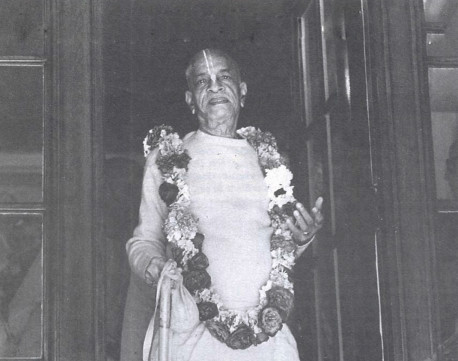
Hare Krishna. I want the books Ocean of Mercy both volumes and chasing the rhino with Swamiji. I would be grateful for pdf copies through email.